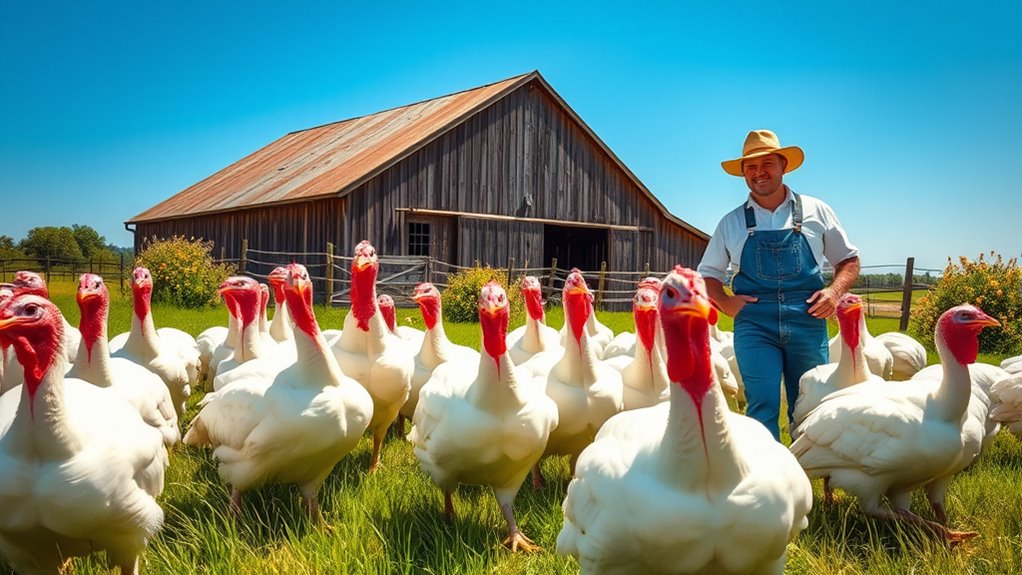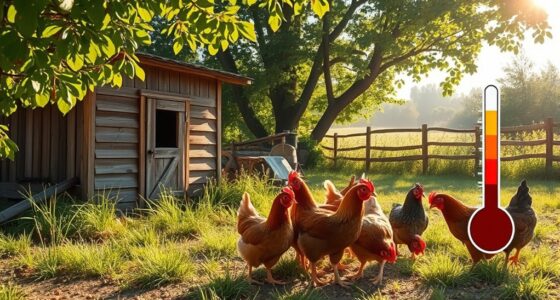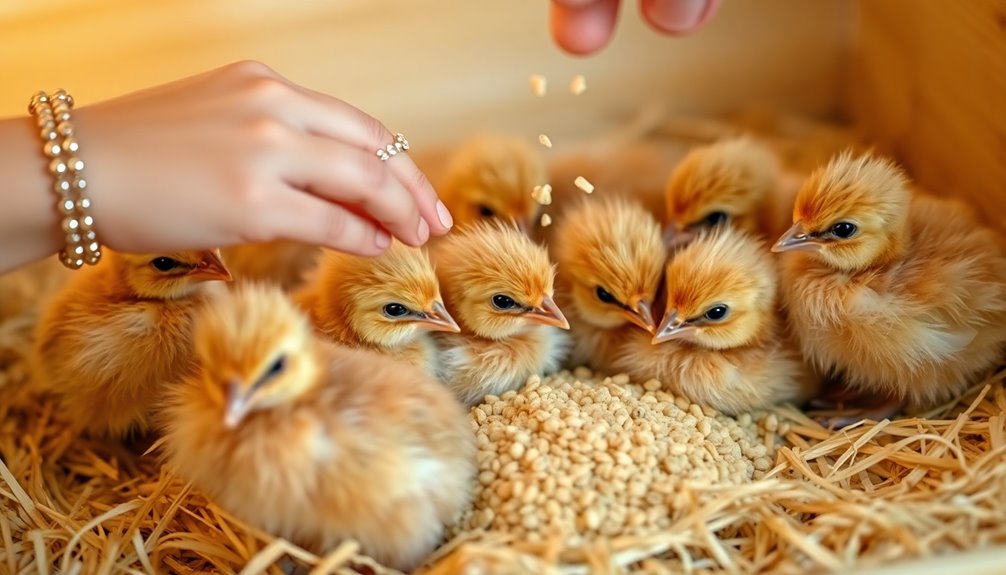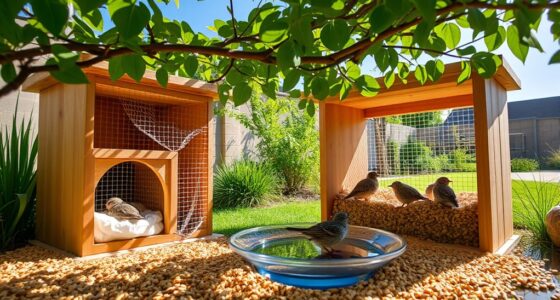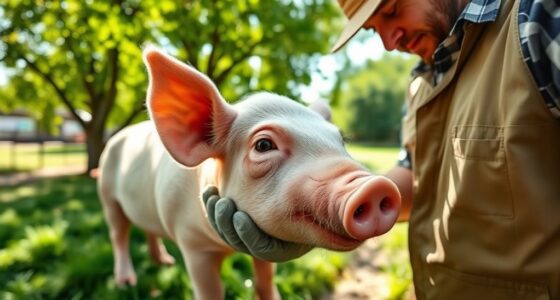Raising turkeys for meat can be a rewarding and profitable venture. You'll enjoy high-quality meat that outperforms store-bought options and benefit from engaging in sustainable farming practices. It's essential to balance nutrition and manage costs effectively to avoid dips into loss. Proper housing and health management create a stress-free environment for your birds. With the right approach, you'll cultivate your knowledge and enhance your skills in agriculture. Discover more about maximizing your success in turkey farming.
Key Takeaways
- Select high-quality breeds to enhance meat yield and improve overall flock health through better genetics.
- Manage feeding costs by tracking expenses and utilizing bulk purchasing to optimize financial viability.
- Ensure proper housing that is dry, well-ventilated, and allows for outdoor access to promote turkey well-being.
- Implement a balanced diet with appropriate protein levels at different growth stages for optimal growth rates.
- Regularly maintain sanitation and biosecurity measures to prevent disease and support long-term flock health.
Why Raise Turkeys?
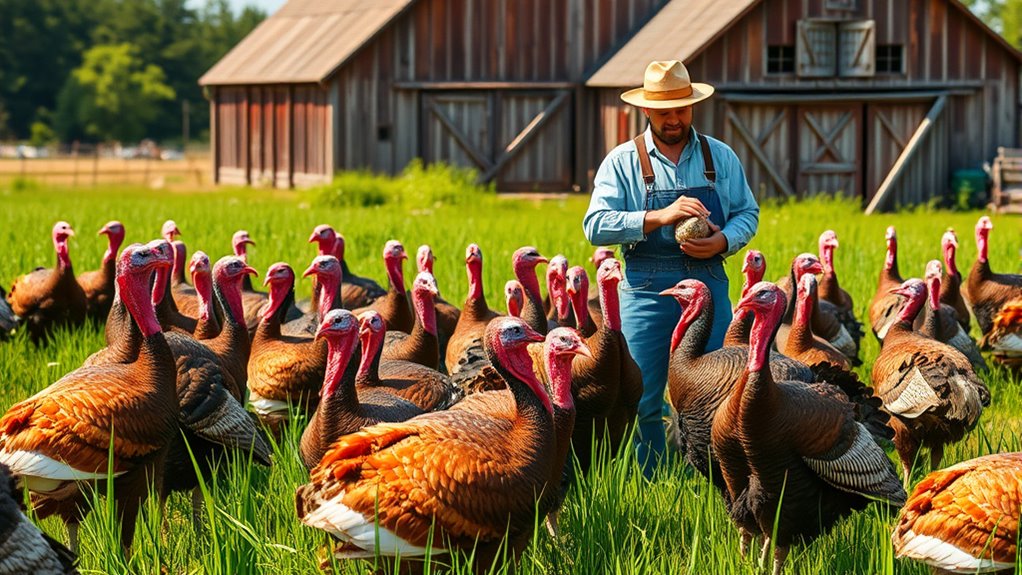
Raising turkeys can be a rewarding venture, especially if you're looking for high-quality meat that outshines what's typically found in stores.
By raising turkeys for meat, you not only get tender, flavorful meat but also tap into a niche market with lower competition compared to chicken farming. Each young turkey can yield over 600 kg of meat and up to 200 eggs annually, enhancing profitability.
Turkey meat is a nutritious choice packed with essential amino acids and complete proteins, making it ideal for personal use or sale.
Engaging in turkey farming supports local food systems and promotes sustainable farming practices, allowing you to enjoy the benefits of a backyard flock while contributing to a healthier community.
Learning Experience
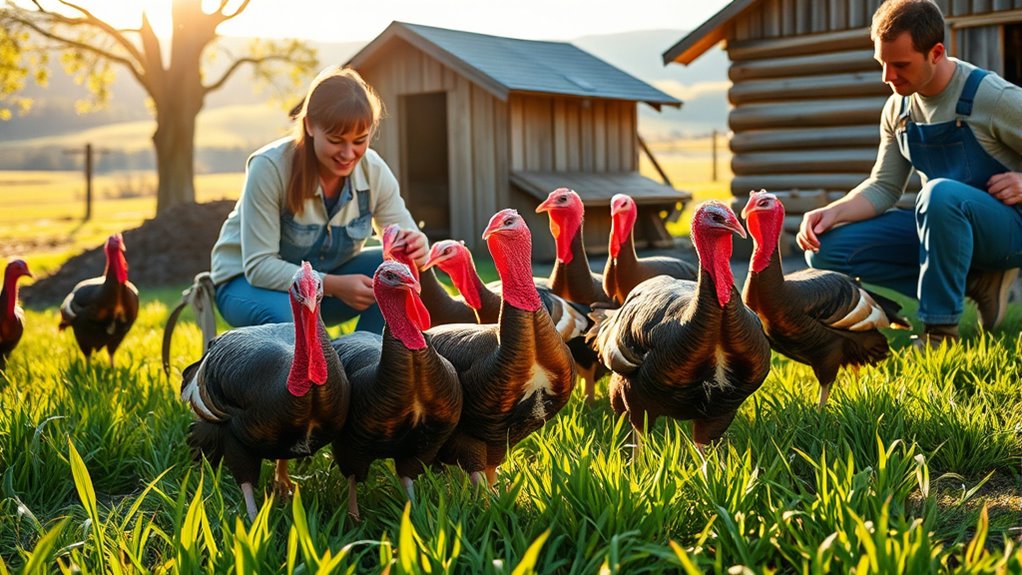
Engaging in turkey farming offers valuable hands-on experience in animal husbandry that enhances your practical knowledge for future agricultural projects. As you raise turkeys for meat, you'll immerse yourself in breeding, feeding, and health management, all essential for a successful operation. This learning experience cultivates financial literacy, as you monitor expenses versus income, critical for sustainable practices in agriculture.
| Aspect | Details | Benefits |
|---|---|---|
| Breeding | Understanding genetics | Improved turkey quality |
| Feeding | Balanced nutrition | Healthier, faster-growing birds |
| Health Management | Disease prevention | Increased flock longevity |
| Financial Management | Expense tracking | Enhanced business skills |
This journey fosters a deeper appreciation for meat production and sustainable practices in local food systems.
Profit and Loss

While turkey farming can be profitable, understanding the delicate balance of expenses and income is vital to your success. Rising feed costs can quickly alter your operation from profit to loss, especially if you're not monitoring expenses closely.
Initial success may come from low feed prices, but this can mask unsustainable practices that lead to financial challenges later. Producing oversized turkeys might create market challenges due to consumer preferences, further impacting profitability.
Effective cost management and recognizing seasonal fluctuations in expenses are important for your economic viability. Shifting to bulk purchasing can save you money, but make sure you choose the right feed types to avoid excessive growth, which could jeopardize your profit margins.
Raising Meat Turkeys
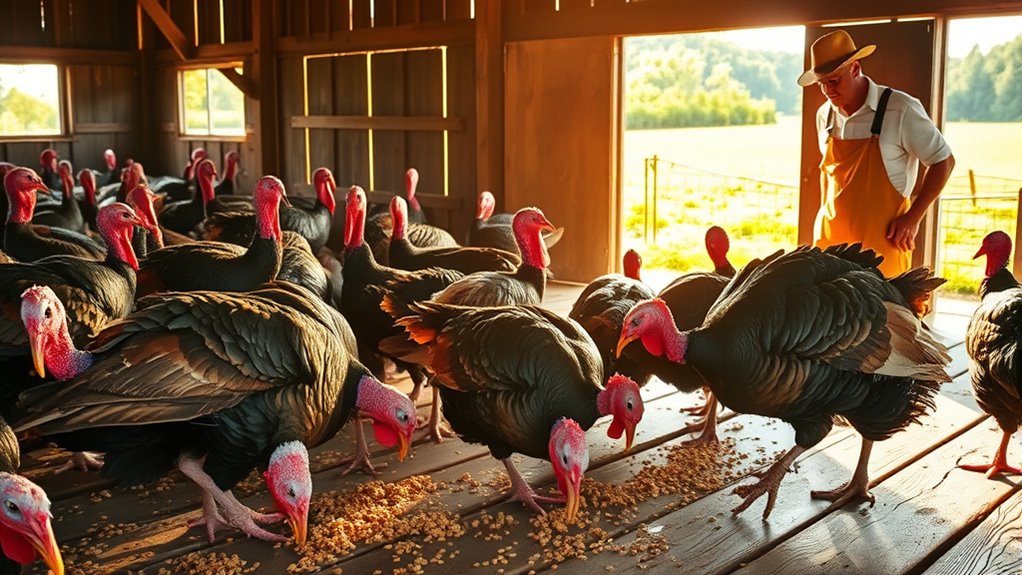
When raising meat turkeys, you'll need to focus on their housing and maintenance requirements to guarantee they thrive.
Proper feeding and health management are essential for maximizing growth and minimizing costs.
Let's explore how you can create the best environment for your turkeys and keep them healthy.
Housing and Maintenance Needs
To raise healthy meat turkeys, you'll need to provide adequate housing that meets their specific needs.
Guarantee your housing accommodates the flock size, following stocking density norms: 15 one-month-old turkeys, 10 two-month-olds, and 5 older than two months per square meter.
Separate adult turkeys from younger birds to maintain a safe environment and reduce stress.
Your housing should be dry and well-ventilated, with nesting areas and outdoor spaces for natural behaviors, enhancing overall health and meat quality.
Regular cleaning and disinfection of the premises, feeders, and drinkers are essential for strong biosecurity measures.
Additionally, providing containers for dust baths will keep the environment comfortable and stress-free, promoting the best possible outcomes for your turkeys.
Feeding and Health Management
After guaranteeing your turkeys have a safe and comfortable living environment, focus on their feeding and health management to promote ideal growth and well-being.
For Turkey poults, provide a starter feed with 30% protein content for the first week, then shift to turkey grower feed with 18% protein. Daily feed allowances vary from 30 grams for chicks to 400 grams for adults, depending on the Turkey breeds you choose.
Always guarantee access to clean water; young turkeys may benefit from boiled water mixed with sugar.
Maintain proper sanitation by regularly cleaning housing and feeders to prevent disease. Additionally, encourage dust baths to enhance health and reduce stress, guaranteeing a thriving backyard flock and improving meat quality.
Processing
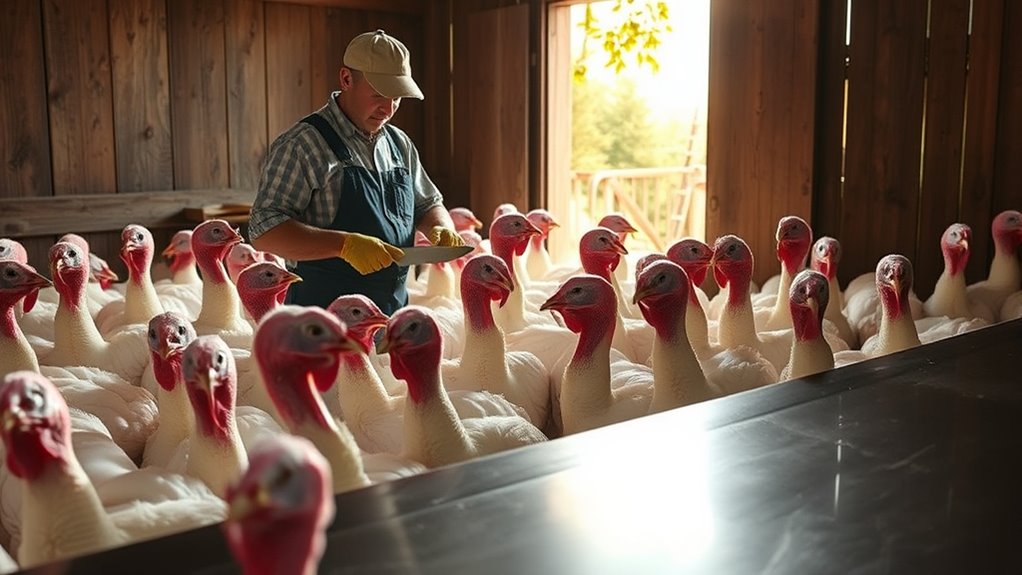
Processing turkeys is a essential step that typically occurs when they reach a marketable weight of around 20-26 weeks, ensuring you're ready for consumption or sale.
Males are ideally processed at 182 days, while females are ready at 154 days. It's important to comply with local zoning laws during processing, whether you're doing it at home or using a custom facility.
Proper sanitation and biosecurity measures are significant to prevent contamination and keep your turkey carcass safe for consumption.
Planning your processing schedule in advance will help you maximize yield, which can be 60-65% of the live weight, or up to 80% with partial evisceration, for both personal consumption and sales.
Timing is everything!
Words of Wisdom

When raising turkeys for meat, remember that careful planning and management can greatly boost your success. Aim for turkeys to reach their marketable age between 20-26 weeks, ensuring you maximize returns by managing their feed and housing effectively.
Provide a balanced diet rich in grains, root vegetables, and essential supplements for healthy growth. Keep in mind that production costs can soar in winter, especially in northern climates, so consider seasonal farming to optimize your expenses.
Effective marketing is key to promoting turkey meat's unique taste and nutritional benefits, helping it compete with chicken in the market. With the right strategies, raising meat turkeys can be a profitable venture that satisfies both your consumers and your wallet.
Frequently Asked Questions
How Long Does It Take to Raise a Turkey for Slaughter?
It typically takes you about 20 to 26 weeks to raise a turkey for slaughter.
If you're focusing on female turkeys, you'll find they reach ideal market age around 154 days, while males take a bit longer at about 182 days.
During this time, they can gain significant weight, with females reaching up to 14 kg and males up to 21 kg by the time they're ready for processing.
What Are the Disadvantages of Turkey Farming?
Turkey farming has several disadvantages you should consider.
You'll face challenges like high feed costs, as turkeys can be picky eaters. Young poults are especially vulnerable to diseases, which can lead to significant mortality if not managed well.
Additionally, marketing turkey meat can be tough due to its lower popularity compared to chicken, making it harder to penetrate certain markets.
Finally, managing a breeding flock requires advanced knowledge that can overwhelm newcomers.
Is It Worth It to Raise Your Own Turkeys?
Raising your own turkeys can definitely be worth it. You get to enjoy fresh, flavorful meat that often surpasses store-bought options.
Plus, you'll have more control over the quality and care of your birds, resulting in healthier flocks. While there are costs involved, like feed and heating, the potential for profitability and the satisfaction of sustainable farming can make it a rewarding venture for you and your family.
What Is the Best Breed of Turkey to Raise for Meat?
Ah, the quest for the perfect turkey breed—it's a noble pursuit, akin to finding the Holy Grail, if the Grail were plump and delicious.
If you're after sheer meatiness, the Broad Breasted White is your champion, growing like a weed in just five months.
For a touch of tradition, consider heritage breeds like Bourbon Red; they're flavorful and hardy.
Ultimately, it depends on your palate and market demand—choose wisely!
Conclusion
In the end, raising turkeys for meat can be a fulfilling venture, blending passion with profit. While you nurture these birds, you're not just cultivating a source of sustenance; you're participating in a time-honored tradition. Embrace the learning journey, and remember that every step, from care to processing, contributes to a rewarding experience. As you venture into this endeavor, may your efforts yield bountiful rewards and a deeper connection to the circle of life.

